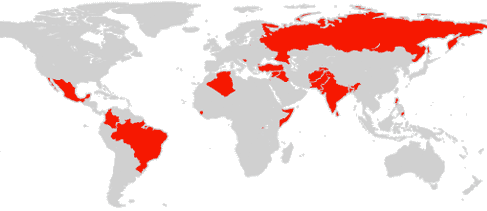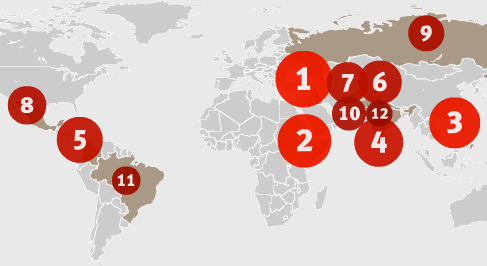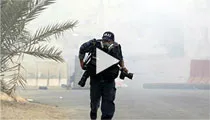Brazil’s international profile remained on the rise, but its government consistently failed to show leadership on press freedom issues. Anti-press violence surged with four work-related fatalities; the country’s ranking also worsened on CPJ’s Impunity Index, which highlights countries where journalists are killed regularly and the authorities fail to solve the crimes. Along with India and Pakistan—two other countries that rank poorly on the Impunity Index—Brazil raised objections to a comprehensive UNESCO proposal to help nations combat impunity and protect journalists. In the face of heavy criticism, U.N. Ambassador Maria Luiza Ribeiro Viotti later expressed broad support for press freedom and elements of the UNESCO plan. But the government’s commitment to free expression came into question in another important international matter. Brazil supported an Ecuadoran-led effort to weaken the Inter-American Commission on Human Rights, the human rights monitoring body of the Organization of American States, and its special rapporteur for freedom of expression. In December, investigative reporter and CPJ International Press Freedom Awardee Mauri König fled Brazil after receiving death threats related to his coverage of police corruption. President Dilma Rousseff’s government did usher in two measures promoting the public’s right to know. Rousseff signed into law an access-to-information measure and created a commission to investigate human rights abuses committed during the country’s 1964-1985 military dictatorship.
Brazil
» Lethal violence against journalists surges, impunity worsens.
» Government fails to support press freedom in international venues.
Brazil’s international profile remained on the rise, but its government consistently failed to show leadership on press freedom issues. Anti-press violence surged with four work-related fatalities; the country’s ranking also worsened on CPJ’s Impunity Index, which highlights countries where journalists are killed regularly and the authorities fail to solve the crimes. Along with India and Pakistan—two other countries that rank poorly on the Impunity Index—Brazil raised objections to a comprehensive UNESCO proposal to help nations combat impunity and protect journalists. In the face of heavy criticism, U.N. Ambassador Maria Luiza Ribeiro Viotti later expressed broad support for press freedom and elements of the UNESCO plan. But the government’s commitment to free expression came into question in another important international matter. Brazil supported an Ecuadoran-led effort to weaken the Inter-American Commission on Human Rights, the human rights monitoring body of the Organization of American States, and its special rapporteur for freedom of expression. In December, investigative reporter and CPJ International Press Freedom Awardee Mauri König fled Brazil after receiving death threats related to his coverage of police corruption. President Dilma Rousseff’s government did usher in two measures promoting the public’s right to know. Rousseff signed into law an access-to-information measure and created a commission to investigate human rights abuses committed during the country’s 1964-1985 military dictatorship.
Four journalists were killed in Brazil in direct retaliation for their reporting. A fifth journalist was killed under unclear circumstances, and CPJ continues to investigate.
The 24 work-related murders of journalists over the past two decades make Brazil the third deadliest country in the Americas, behind only Colombia and Mexico, and 11th in the world, CPJ research shows.

| 1. Iraq: 151 2. Philippines: 73 3. Algeria: 60 4. Russia: 54 5. Somalia: 48 6. Pakistan: 48 7. Colombia: 44 | 8. Syria: 30 9. India: 29 10. Mexico: 28 11. Brazil: 24 12. Afghanistan: 24 13. Turkey: 20 14. Bosnia: 19 | 15. Sri Lanka: 19 16. Tajikistan: 17 17. Rwanda: 17 18. Sierra Leone: 16 19. Bangladesh: 13 20. Israel and the Occupied Palestinian Territory: 12 |
52 percent
Suspected to have been committed by government officials67 percent
Victims who covered government corruption43 percent
Victims who were threatened beforehandCPJ’s Impunity Index found that Brazil is the world’s 11th worst nation in combating deadly anti-press violence, with five unsolved murders over the past decade.

| 1. Iraq 2. Somalia 3. Philippines 4. Sri Lanka | 5. Colombia 6. Nepal 7. Afghanistan 8. Mexico | 9. Russia 10. Pakistan 11. Brazil 12. India |
A São Paulo court ordered a former army colonel, Carlos Alberto Brilhante Ustra, to pay damages to the family of journalist Luiz Eduardo da Rocha Merlino, who was tortured and killed while jailed in 1971, during the country’s military dictatorship. It is the first time an individual has been ordered to pay compensation for dictatorship-era crimes.
2 | Years in which the newly formed truth commission will work on a report on human rights abuses during the dictatorship era |
0 | Possible prosecutions due to a 1979 law that provided blanket amnesty for crimes committed during the regime |

